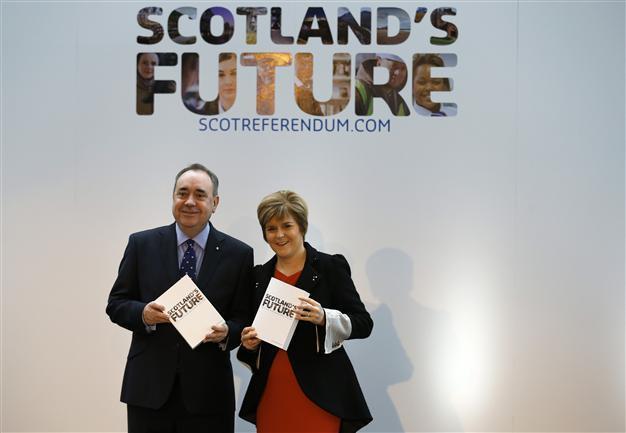Scotland unveils blueprint for independence
GLASGOW - Agence France-Presse

Scotland's First Minister Alex Salmond (L) and deputy First Minister Nicola Sturgeon hold copies of the referendum white paper on independence during its launch in Glasgow, Scotland November 26, 2013. REUTERS Photo
An independent Scotland would keep Queen Elizabeth II as its monarch but create its own defence force, nationalist leader Alex Salmond said Tuesday as he unveiled detailed proposals ahead of next year's historic referendum.Launching his regional government's long-awaited "white paper" on independence, Salmond said he could build a "wealthier and fairer nation" if Scots vote next September to end the 300-year-old union with London.
"We'd become independent in more promising circumstances than virtually any other nation in history," Salmond, the first minister, told a packed news conference in Scotland's biggest city Glasgow.
"Ultimately at the heart of this debate there is only one question and one choice.
"Do we, the people who live and work in Scotland, believe that we are the best people to take decisions about Scotland's future?" Among the proposals in the 670-page tome, an independent Scotland would take 90 percent of revenues from the North Sea oil reserves lying off its shores and would no longer play host to Britain's Trident nuclear deterrent -- both highly contentious issues.
Salmond did admit however that while Scotland had "huge" hydrocarbon resources for another 50 years, "we need to build renewable wealth which will last forever".
An independent Scotland would continue to use the pound as its currency, but would ditch the BBC as its national broadcaster.
With 10 months to go until the vote, Salmond's Scottish National Party (SNP) is struggling to convince Scots -- some 38 percent are currently planning to vote for independence, according to a Panelbase survey for the Sunday Times, while 47 would vote against.
Salmond insisted there was a strong economic case for independence and that Scotland's "immense" natural resources would guarantee a prosperous future.
His deputy Nichola Sturgeon said the document "puts beyond any doubt that Scotland can afford to be independent".
But Salmond added that the new country would also have to tackle a "legacy of debt, low growth and social inequality" bequeathed to it by the London government.
The white paper sets out Salmond's vision of how he believes independence would affect Scots, from taxation and pensions to welfare, education and defence. The white paper says a vote against independence would mean "Scotland stands still".
But Britain's former finance minister Alistair Darling, who is leading the "no" campaign, said it was "complete fantasy to believe that you can leave the UK but keep all the benefits of being part of it".
"This document will be judged on its credibility," he told BBC radio.
"No one is going to tell me that all the good things will stay north of the border and all the bad things will go to the south." Scots are generally "pretty sceptical about the whole idea of independence", he added.
Britain's Chief Secretary to the Treasury Danny Alexander warned Salmond on Tuesday that under independence the average basic rate taxpayer in Scotland would face a tax rise of 1,000 (1,200 euros, $1,600) a year by the end of the decade.
"This is a very stark reminder of why it is in the interest of Scotland to pool these risks, not go it alone," he wrote in a letter.
Prime Minister David Cameron's Conservative-led government is pushing hard for a "no" vote in the referendum.
Scots will be able to request a hard copy of the white paper, and it will also be available to read online.
The document plans for Scotland to celebrate its independence day on March 24, 2016 and hold its first parliamentary elections in May 2016.
March 24 has a symbolic importance because it marks the anniversary of the signing of the Acts of Union in 1707, which joined Scotland and England into a single kingdom.
Scotland's devolved government currently has control over a range of policies including health and education, but other key policy areas -- including defence, foreign policy and welfare -- are still controlled by London.
Salmond's critics warn that a "yes" vote would throw up huge headaches for Edinburgh and London.
Rejoining the European Union and NATO could also be problematic, the "no" camp claims.
















